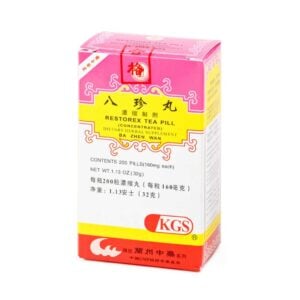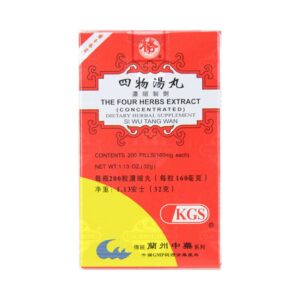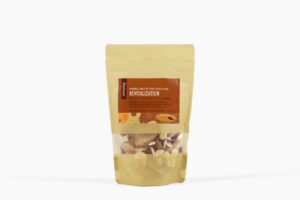Your cart is currently empty!
Pregnancy is a time of transformation, growth, and, perhaps most importantly, careful decision-making.
Many expecting mothers look for natural ways to support their health and well-being during this important time in their lives – and Chinese herbs for pregnancy may be one of those natural solutions.
Traditional Chinese Medicine (TCM) offers a wealth of herbal remedies that can ease common pregnancy discomforts like nausea or back pain, nourish both mother and baby, and promote overall balance.
But how safe are Chinese herbs during pregnancy?
While TCM has been used for centuries to support reproductive health, extra care is needed when selecting and using herbs during pregnancy. Some are highly beneficial, while others should be avoided.
Let’s get a clearer idea of the role of Chinese herbs in pregnancy so you can make informed decisions and find healthy, safe relief for your symptoms.
TCM in Pregnancy: How Does it Help?
Unlike Western medicine, which often focuses on treating symptoms alone, TCM views pregnancy as a dynamic process. The body changes quickly, and all the organ systems need to work in harmony for you to feel your best.
But, because pregnancy is such a powerful transformation, it’s likely that something will get imbalanced along the way. That’s normal! If you’re balanced, your body will adapt quickly and those symptoms will pass. But if there’s a deeper underlying issue, you may struggle with ongoing issues like:
- Morning sickness or vomiting
Morning sickness is often the first symptom to arise in pregnancy. Gentle herbs like ginger and tangerine peel help soothe the stomach, settle the digestive system, and ease queasiness naturally. - Fatigue and low energy
During pregnancy, your body needs much more qi and blood than usual. Growing a baby is a lot of work, after all! If you’re feeling fatigued, it’s a sign you are using up more energy than you have in reserve. Gentle tonic herbs like dang shen and astragalus help replenish energy reserves, while blood-nourishing formulas like Ba Zhen Tang can support your overall vitality. After you’ve delivered your baby, consider Nu Ke Ba Zhen Tang which is specifically designed to rebuild your energy postpartum. - Stress and emotional balance
Pregnancy brings hormonal shifts that can affect your mood, which is linked to Liver qi stagnation in TCM. Herbs like bai shao and formulas such as Si Wu Tang gently soothe the nervous system, helping to ease tension and support emotional well-being. - Digestive issues
As pregnancy progresses, constipation is a common complaint as your hormones change and the baby puts more pressure on your digestive organs. Herbs like chen pi and gentle formulas such as Chinese Herbal Soup and Broth Mix for Revitalization help regulate digestion, reduce bloating, and promote smoother digestion. - Immune support
Pregnancy naturally shifts your immune system to protect the baby. But, this sometimes leaves you more susceptible to illness. TCM supports immunity through herbs like huang qi, which strengthen defensive qi (your immunity) without overstimulating the body.
What Chinese Herbs are Safe for Pregnancy?
Some Chinese herbs have been safely used for centuries during pregnancy when taken in the right amounts. They work by gently supporting your body’s natural rhythms – helping with energy, digestion, and overall balance – without being too harsh or causing side effects.
- Ginger (Sheng Jiang): A well-known remedy for nausea and morning sickness, ginger soothes the stomach and aids digestion.
- Dang Shen (Codonopsis Root): This mild adaptogen supports energy and immune function, making it a safe alternative to ginseng during pregnancy.
- Bai Shao (White Peony Root): Helps nourish blood, ease muscle tension, and reduce cramping.
- Huang Qi (Astragalus): Strengthens immunity and boosts overall vitality, particularly in women experiencing low energy.
- Chen Pi (Aged Tangerine Peel): Supports digestion and alleviates bloating, making it useful for those experiencing sluggish digestion.
- Da Zao (Jujube Date): A gentle, nourishing herb that helps build blood, strengthen digestion, and support overall energy levels during pregnancy.
TCM Formulas That Support Pregnancy
While single herbs can be helpful (like ginger for nausea), most herbs are meant to be used in combination. For those looking for safe and effective herbal support, several TCM formulas have been traditionally used to promote a healthy pregnancy.
-
 Ba Zhen Wan – Restorex Teapill – by Kingsway (KGS) Brand
Starting at $6.99
Add to CartSelect options
This product has multiple variants. The options may be chosen on the product page
Ba Zhen Wan – Restorex Teapill – by Kingsway (KGS) Brand
Starting at $6.99
Add to CartSelect options
This product has multiple variants. The options may be chosen on the product page
Ba Zhen Tang (Eight Treasure Decoction)
This classic formula nourishes both qi and blood, making it beneficial for those experiencing fatigue, dizziness, or weakness during pregnancy.
-
 Si Wu Tang Wan – The Four Herbs Extract – Kingsway (KGS) Brand
Starting at $6.99
Add to CartSelect options
This product has multiple variants. The options may be chosen on the product page
Si Wu Tang Wan – The Four Herbs Extract – Kingsway (KGS) Brand
Starting at $6.99
Add to CartSelect options
This product has multiple variants. The options may be chosen on the product page
Si Wu Tang (Four Substances Decoction)
Often recommended for its blood-nourishing properties, this formula supports circulation and overall well-being. In pregnancy, this formula can help you regain your energy and feel stronger.
Chinese Herbal Soup and Broth Mix for Revitalization – by Root + Spring
Make food your medicine with this delicious herbal broth kit. This herbal pack is a gentle, nutrient-rich blend that enhances digestion, energy, and overall nourishment without overstimulating the body.
These formulas offer a natural way to maintain balance and health, but they should always be used under the supervision of a qualified TCM herbalist to make sure they will be safe and effective for your unique circumstances.
Chinese Herbs to Avoid During Pregnancy
While some herbs are considered helpful tonics in pregnancy, other herbs are too strong or stimulating and should be avoided. Many of these herbs influence blood circulation, body temperature, or hormone levels in ways that could be risky.
- Hong Hua (Safflower) and Tao Ren (Peach Kernel)
This duo is often used in formulas to move blood. They should be avoided as they may induce contractions. - Fu Zi (Aconite)
Fu zi is a powerful yang tonic, but is too warming and stimulating to use during pregnancy. - Ban Xia (Pinellia)
This herb is often used for dampness and nausea, but is too strong and not recommended for pregnancy-related nausea. - Large doses of cooling herbs (Huang Lian, Huang Qin, Huang Bai, Da Huang)
While these herbs clear heat, they may also drain energy rapidly, which is not ideal during pregnancy.
This list covers some of the more commonly used herbs, and is not exhaustive of the ones you should avoid while pregnant. It’s always best to speak with a practitioner before starting any new supplement or herbal formula when pregnant.
How to Use Chinese Herbs Safely During Pregnancy
TCM can be an excellent ally during pregnancy. However, it is important to approach herbal remedies with caution and mindfulness. Here are a few key guidelines for using Chinese herbs safely:
- Work with a licensed TCM herbalist
Personalized guidance ensures that the herbs and formulas chosen align with your specific needs and pregnancy stage. - Avoid self-prescribing
Even mild herbs can have unexpected effects when combined with other treatments or conditions. - Use well-established pregnancy formulas
Stick to herbal blends designed specifically for pregnancy rather than general tonics. - Monitor for changes in symptoms
If an herbal remedy causes discomfort, stop using it and consult a professional.
The Bottom Line: Are Chinese Herbs Safe for Pregnancy?
When used correctly, Chinese herbs can be a gentle, natural way to support your body during pregnancy. They can help ease nausea, pain, bloating, constipation, support energy, and promote your overall health – and your baby’s.
However, not all herbs are safe, and taking the wrong ones could lead to side effects or risks. Stick to time-tested pregnancy formulas or reach out to a qualified herbalist for tailored support.
And don’t forget to consider Chinese herbs for postpartum recovery! There are many remedies designed to build your Qi, blood, and fluids after delivery and help you embrace early motherhood with ease, joy, and comfort.
Share This
Table of Contents
- TCM in Pregnancy: How Does it Help?
- What Chinese Herbs are Safe for Pregnancy?
- TCM Formulas That Support Pregnancy
- Chinese Herbs to Avoid During Pregnancy
- How to Use Chinese Herbs Safely During Pregnancy
- The Bottom Line: Are Chinese Herbs Safe for Pregnancy?
About the Author
Blog Categories
- Adaptogen Articles (8)
- Brain Health Articles (9)
- Chinese Medicine Basics Articles (13)
- Chinese Medicine for Pain Articles (15)
- Chinese Medicine for Pets Articles (3)
- Chinese Medicine for Skin Conditions Articles (6)
- Chinese Medicine Formula Articles (6)
- Chinese Medicine Sleep Articles (4)
- Conditions & Concerns Articles (24)
- Digestive Issues (5)
- Eating for the Seasons (2)
- Health & Lifestyle Articles (17)
- Heart Health Articles (4)
- In the News (1)
- Medicinal Mushrooms Articles (7)
- Men's Health Articles (8)
- Scholarships (5)
- Uncategorized Articles (9)
- Weight Loss, Diet & Obesity Articles (5)
- Women's Health Articles (10)
Articles Related To Are Chinese Herbs Safe to Take During Pregnancy?
-
Colds are a cold weather problem, right? While they can be more common in the fall and winter, we are just as susceptible to getting sick in the heat of summer! And there’s nothing worse than coming down with a cold when the sun is shining and everyone else is enjoying the summer season. Summer…
-
Have you ever felt like stress is getting the best of you? Or maybe your digestion seems off, your sleep is disrupted, or you’re experiencing headaches that won’t go away? In Traditional Chinese Medicine (TCM), these symptoms often point to an imbalance in one of the body’s most crucial organ systems: the Liver. Blaming your…
-
Sometimes fatigue goes beyond just feeling tired. If you are living with Chronic Fatigue Syndrome (CFS), the persistent exhaustion, brain fog, and inability to feel truly rested make even simple tasks seem monumental. While Western medicine offers limited solutions to those with CFS, Traditional Chinese Medicine (TCM) can step in to offer some much-needed support.…
-
Starting a new health journey is exciting. You set your sights on goals like better energy, improved focus, or simply feeling good in your body. You imagine how you’ll feel in a few months or even this time next year and start to feel unstoppable. That is, until that early motivation wears off. As the…
-
New Year’s resolutions are motivating in January, when the excitement of a new start is fresh. By February, however, that initial excitement of those goals you set often starts to wane. But who says meaningful change has to be tied to January 1st? True transformation comes from consistent, sustainable shifts in how we live every…


 Chinese Herbal Soup and Broth Mix For Revitalization – by root + spring
Chinese Herbal Soup and Broth Mix For Revitalization – by root + spring